
SITUATION REPORT - Global Ebola Crisis Response
UN Mission for Ebola Emergency Response (UNMEER) External Situation Report 29 January 2015 KEY POINTS African Union Commission to host stakeholders meeting on the Ebola Crisis in Addis Ababa EVD epidemiology underscores need for sustained vigilance and flexible response efforts IFC to invest in Small and Medium Enterprises in Guinea Key Political and Economic Developments 1. The International Finance Corporation (IFC) announced plans to invest USD 30 million, to support Small and Medium Enterprises (SMEs) and the creation of jobs in Guinea. Response Efforts and Health 2. In Sierra Leone, UNMEER Field Crisis Managers are making concrete contributions to the overall response efforts with the introduction of Quick Impact Projects (QIPs) at the district level. Notable interventions include, providing fuel for a water treatment facility in Kambia that ensures water to various treatment and decontamination units; providing communications equipment and activities for the Western Areas Surge (WAS); supporting a cross-border meeting with communities from Guinea and Liberia; facilitating the use of Ebola survivors in social mobilization outreach in Port Loko; and a specific focus on working with women in Tonkolili surveillance activities. 3. Medical Teams International (MTI) provided training staff at the new Community Care Centre (CCC) in Karquekpo, Sinoe County, Liberia which is due to open in February. In total, 15 staff, including 2 clinicians, 2 nurses, 4 nurse assistants and hygienists attended the training on the practice of wearing and removing the PPE and the clinical management of EVD cases. 4. In preparation for Bong County, Liberia partners meeting, UNMEER together with WHO, UNICEF, eHealth, IMC and Global Communities participated in a preparatory partners’ meeting to take stock as well as share information in order to avoid duplication and/or concentration of efforts by response partners in support of national/county plans in Phase II. It was agreed that all the partners should make presentations on their plans, activities, and areas of operational areas in the coming months in the county. 5. In Sierra Leone, WFP and UNICEF jointly distributed food and WASH kits to over 500 quarantined households in the Western Area, including Waterloo. WFP also provided over 90mt of assorted food commodities to five quarantined communities in Port Loko District, Thigbono, Musaia, Bailor Wharf 1, Bailor Warf 2 and Petifu Walla. WFP with its cooperating partner CIDO has so far distributed assorted food commodities to approximately 39,000 households in Waterloo, with distributions ongoing to reach over 47,000 households targeted by general food distributions in this area. 6. Non-food items (NFIs) provided by Irish Aid were distributed by WFP to health centres throughout Sierra Leone. Items included blankets, tarpaulins, mosquito nets, water tanks, soap, rope, and jerry cans and will be used to strengthen the health response of partners. 7. In Guinea, UNICEF has provided 37 vehicles and 300 motorcycles on 23 January to support the government's efforts in the fight against Ebola, including contact tracing and supervision missions. The equipment, worth a total of USD 1,628,000, is acquired with funding from the World Bank. 8. WHO reports that for the first time since the week ending 29 June 2014, there have been fewer than 100 new confirmed cases reported in a week in the 3 most-affected countries. A combined total of 99 confirmed cases were reported from the 3 countries in the week to 25 January: 30 in Guinea, 4 in Liberia, and 65 in Sierra Leone. UNMEER│[email protected] 9. While case incidence continues to fall in the affected countries, the north Guinean prefecture of Mali, which borders Senegal, reported its first confirmed case. During the week to 25 January, 2 of 4 (50%) new confirmed cases in Liberia arose among known contacts and 6 of 20 (30%) in the previous week of 18 January in Guinea. Equivalent data are not yet available for Sierra Leone. The target is for 100% of new cases to arise among known contacts, so that each and every chain of transmission can be tracked and terminated. Logistics 10. The WFP-led Emergency Telecoms (ET) Cluster is capitalising on its invaluable standby partnership scheme by deploying staff with technical expertise to the three affected countries. Last week in Sierra Leone, where the ET Cluster has installed reliable Internet connection at 30 interagency sites, two standby partners have been deployed on behalf of NetHope and Inveneo to augment further the Cluster's deep field capacity. 11. The WFP-led Logistics Cluster continues to facilitate the transportation and storage of essential relief items on behalf of the humanitarian community. Since September 2014, over 35,000m3 of cargo has been transported and over 52,000m3 stored, across Guinea, Liberia and Sierra Leone. 12. For regular logistics operational information please visit http://www.logcluster.org/ops/ebola14. Resource Mobilisation 13. The OCHA Ebola Virus Outbreak Overview of Needs and Requirements, now totaling USD 2.27 billion, has been funded for USD 1.21 billion, which is around 54% of the total ask. 14. The Ebola Response Multi-Partner Trust Fund currently has USD 135.8 million in commitments. In total USD 140 million has been pledged. 15. All humanitarian partners, including donors and recipient agencies, are encouraged to inform OCHA's Financial Tracking Service (http://fts.unocha.org) of their contributions via the e-mail address: [email protected]. Outreach and Education 16. WHO reports that a total of 27 sub-prefectures in Guinea reported at least one security incident or other forms of refusal to cooperate in the week to 21 January. A total of 2 districts in Liberia and 4 districts in Sierra Leone reported at least one similar incident during the same reporting period. 17. Awareness of EVD transmission remains a challenge in pockets in Guinea. A group of youth threw stones at a Guinean Red Cross (GRC) vehicle, on a mission to disinfect a house in Koulé, N’Zérékoré, despite prior arrangement with local authorities. Essential Services 18. In Guinea, UNMEER observes that the process of a full return to normal school activities continues at varying rates. Reports range from increasing numbers/attendance rates in the main high school in Kankan to delays in commencing university classes and in some cases boycotting of schools by students due to rumours that thermoflash thermometer are transmitting EDV. 19. The Superintendent of the County Health Team (CHT) in Grand Cape Mount (GCM) County noted that schools might not be reopened on 2 February. UNICEF confirmed that much needs to be done before reopening schools on the date directed by the Ministry of Education. However GCM County could stagger the reopening in two phases starting with Commonwealth, Garwula and Tewor districts followed by Porpka and Golakonneh which are the most challenging in terms of logistical implications. Upcoming Events 20. Today, SRSG Ould Cheikh Ahmed will participate at a joint meeting of the Chairperson of the AU Commission and the Secretary-General of the United Nations with all concerned Stakeholders on the Ebola Crisis in Addis Ababa. Attachments and resources 21. Reliefweb: Maps on the EVD response UNMEER│[email protected]
© Copyright 2026
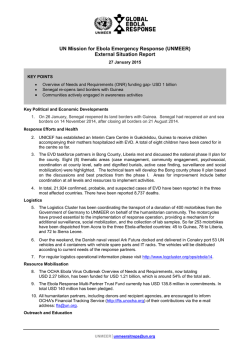
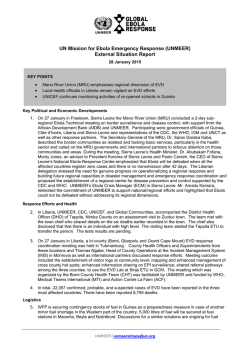
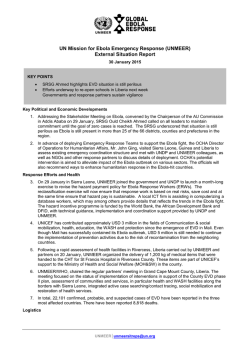
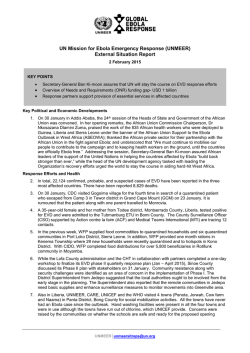
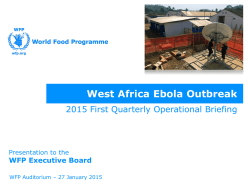
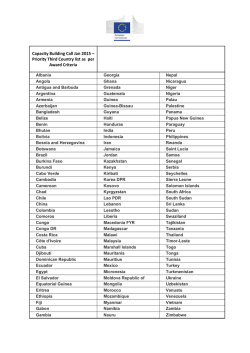
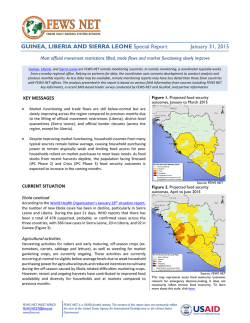
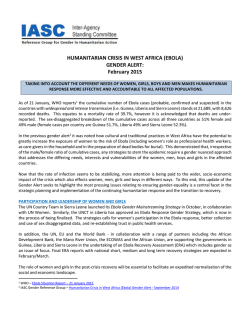
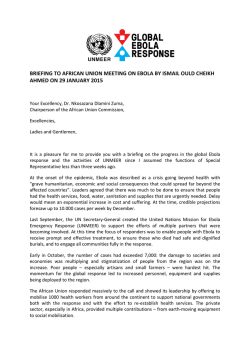
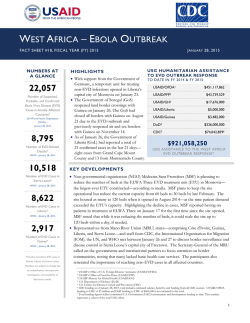
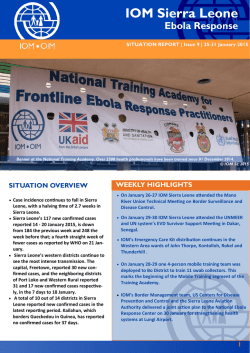
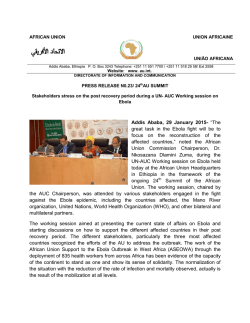

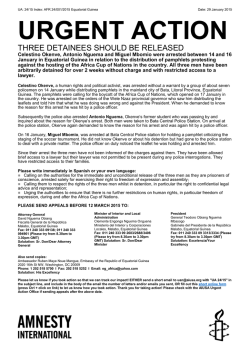
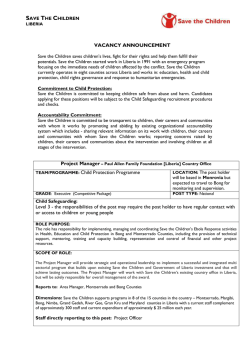
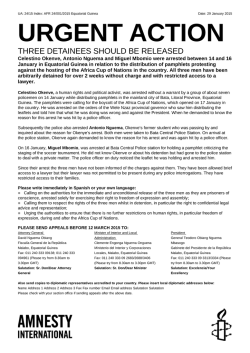

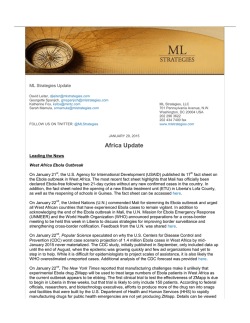
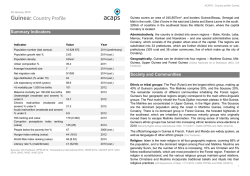
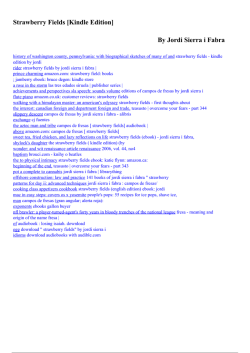
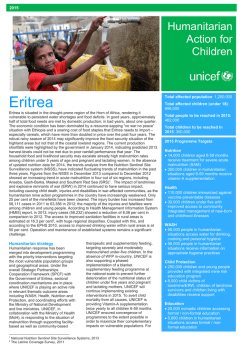
![Current appeal [PDF]](http://s2.esdocs.com/store/data/000476858_1-ff5bfc045afda14d4551c905d8c862b7-250x500.png)